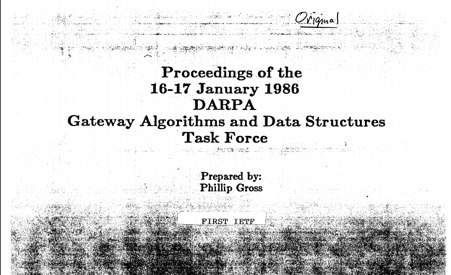Ross Callon attended the 1st IETF meeting in January 1986 in San Diego, California. In this interview, we ask to him to remember the beginnings of the IETF, and how to celebrate the 30th anniversary of the IETF at the next meeting, IETF 95, which will take place in Buenos Aires from 3-8 April.
Ross graduated with a Bachelor of Mathematics from MIT and has a Masters of Science from Stanford. He’s now a Distinguished Engineer at Juniper Networks, author of 14 RFCs, and chair of the MPLS Working Group at IETF.
What was the Internet like 30 years ago?
The Internet was tiny in 1980, and still quite small in 1986 when the first IETF was held. Also, there was no World Wide Web. At the time, the Internet was used to send email, for remote login, and for file transfer. It was used to connect a relatively modest number of US government sites and government contractors, and a few universities.
How did you imagine the Internet would evolve at that time?
From approximately 1980 to 2000, there was never a year in which the Internet “only” doubled; it was growing faster than that. I remember a meeting that preceded the IETF (perhaps 1984 or 1985) where someone stated: “of course the Internet would collapse if it were to ever grow to 10,000 sites.” A counter argument was made (same meeting) that there were a few million companies in the US, so we should think that it might get that large. At the time a million users seemed almost unthinkably huge. I don’t think that anyone expected the Internet to grow to its current size.
To most of us, the World Wide Web just sort of suddenly appeared and immediately took off. The first time I ever heard of the World Wide Web was looking at traffic statistics, perhaps in 1989 or 1990, and seeing this “WWW” application that I had never heard of using a quarter of all the bandwidth on the Internet. Of course this percentage grew very rapidly.
Where were the first IETF attendees from? Was there anyone from Latin America?
I think that all of the attendees at the first IETF were based in the US. Most worked for various US government contractors, or the US government. There were also attendees who were from three universities (Massachusetts Institute of Technology, Stanford, and the University of Michigan). The individual attendees had originally come from multiple countries, but as far as I know all were either working or studying in the US. By 1989, there were participants from multiple countries from at least four continents. Over time IETF participation has of course broadened to experts from all parts of the world.
What would you tell young engineers to make them join the IETF today?
You can make a difference. You can influence how the Internet evolves tomorrow and into the future. Participating in the IETF takes time and effort. It requires both taking time to understand the technical issues, and also taking the time and effort to get to know other people who are participating and contributing. However, you can have a significant impact.
How would you like to celebrate IETF’s 30th anniversary at IETF 95?
Probably have a beer with some friends and colleagues that I have met over the years, and perhaps another beer with some new friends from Buenos Aires! 😉
[Editor’s Note: There’s still time to join us in Buenos Aires from 3-8 April for IETF 95! More information and registration details are available at http://ietf.org/meeting/95/index.html.]
